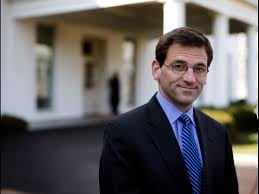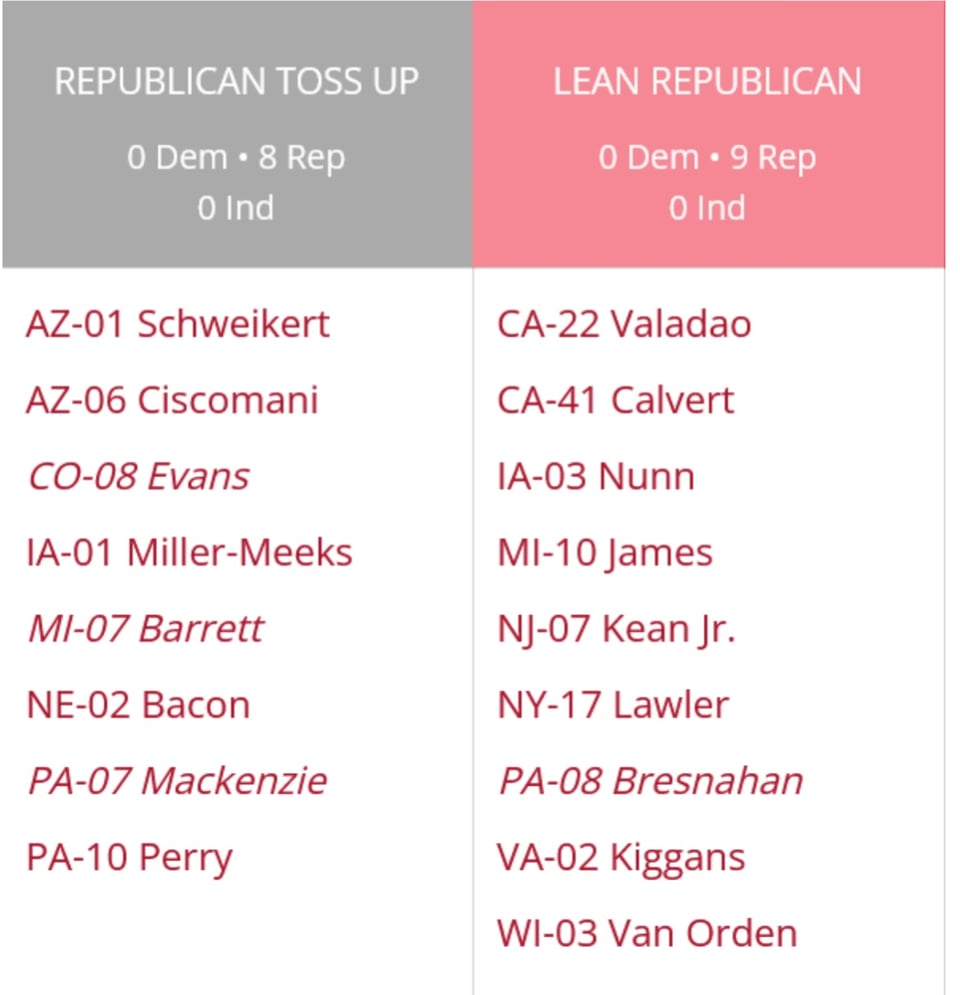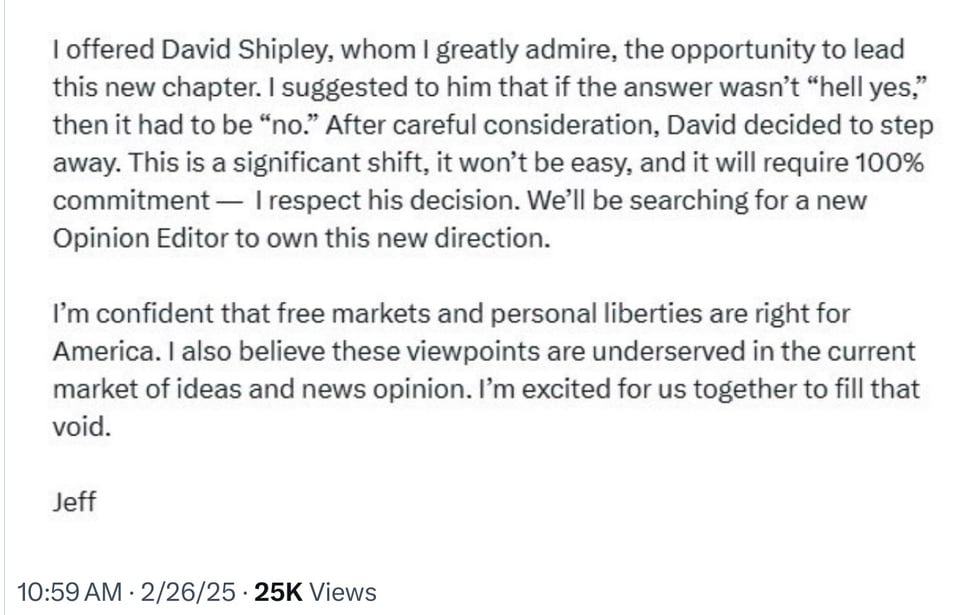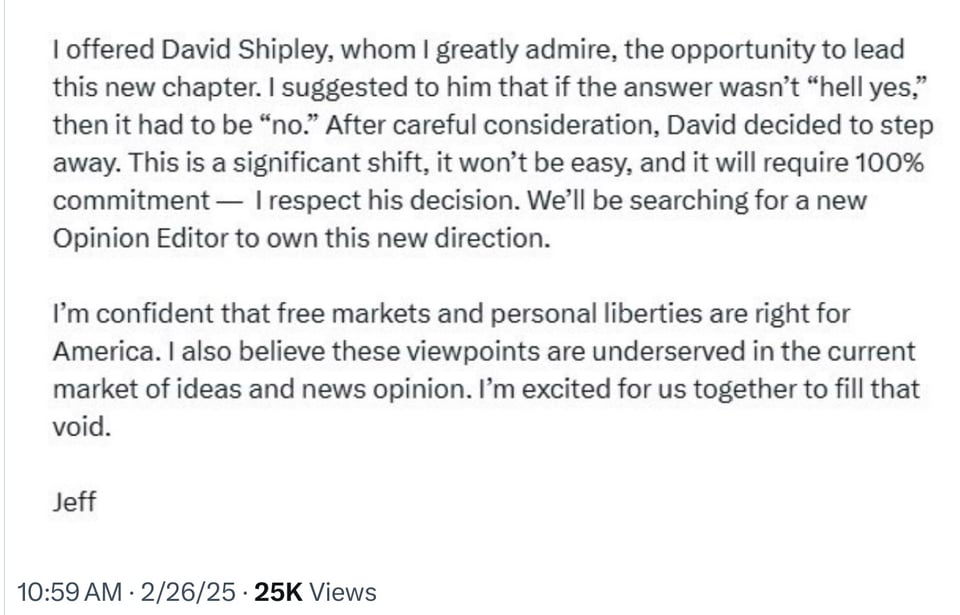Thursday, February 27, 2025. Annette’s Roundup for Democracy.
Yesterday, the Chief White House Correspondent of the New York Times compared Trump to Putin.

This article’s truth is frightening but Peter Baker is giving us great and brave journalism.
In Trump’s Washington, a Moscow-Like Chill Takes Hold.

The former Kremlin pool reporter Yelena Tregubova near her house in Moscow in 2004, after a blast went off in front of her apartment. Ms. Tregubova had been highly critical of President Vladimir V. Putin
She asked too many questions that the president didn’t like. She reported too much about criticism of his administration. And so, before long, Yelena Tregubova was pushed out of the Kremlin press pool that covered President Vladimir V. Putin of Russia.
In the scheme of things, it was a small moment, all but forgotten nearly 25 years later. But it was also a telling one. Mr. Putin did not care for challenges. The rest of the press pool got the message and eventually became what the Kremlin wanted it to be: a collection of compliant reporters who knew to toe the line or else they would pay a price.
The decision by President Trump’s team to handpick which news organizations can participate in the White House press pool that questions him in the Oval Office or travels with him on Air Force One is a step in a direction that no modern American president of either party has ever taken. The White House said it was a privilege, not a right, to have such access, and that it wanted to open space for “new media” outlets, including those that just so happen to support Mr. Trump.
But after the White House’s decision to bar the venerable Associated Press as punishment for its coverage, the message is clear: Any journalist can be expelled from the pool at any time for any reason. There are worse penalties, as Ms. Tregubova would later discover, but in Moscow, at least, her eviction was an early step down a very slippery slope.
A new administration’s efforts to pressure the news media, punish political opponents and tame the nation’s tycoons evoke the early days of President Vladimir V. Putin’s reign in Russia.
The United States is not Russia by any means, and any comparisons risk going too far. Russia barely had any history with democracy then, while American institutions have endured for nearly 250 years. But for those of us who reported there a quarter century ago, Mr. Trump’s Washington is bringing back memories of Mr. Putin’s Moscow in the early days.
The news media is being pressured. Lawmakers have been tamed. Career officials deemed disloyal are being fired. Prosecutors named by a president who promised “retribution” are targeting perceived adversaries and dropping cases against allies or others who do his bidding. Billionaire tycoons who once considered themselves masters of the universe are prostrating themselves before him.
Judges who temporarily block administration decisions that they believe may be illegal are being threatened with impeachment. The uniformed military, which resisted being used as a political instrument in Mr. Trump’s first term, has now been purged of its highest-ranking officers and lawyers. And a president who calls himself “the king,” ostensibly in jest, is teasing that he may try to stay in power beyond the limits of the Constitution.
Some versions of this are not new, of course. Other presidents have taken actions that looked heavy-handed or put pressure on opponents. No president in my experience at the White House, which goes back to 1996, particularly liked news coverage of him, and certainly there have been times when journalists were penalized for their reporting.
After an article on whether Vice President Dick Cheney might be dropped from the re-election ticket in 2004, The New York Times found it no longer had a seat on Air Force Two. President Barack Obama’s team tried to exclude Fox News from a briefing offered to other networks, only to back down when the rest of the press corps stood up for Fox.
But those relatively contained disputes were nothing like what is happening now. The White House takeover of the pool — a rotating group of about 13 correspondents, photographers and technicians given close access to the president so they can report back to their colleagues — upends the way the president has been covered for generations.
The alarm has been felt by media outlets across the spectrum. Just as the other networks backed Fox against the Obama administration, Fox has backed The Associated Press against the Trump White House and its senior White House correspondent criticized the pool takeover. The precedent being set now, certainly, could be used by a future Democratic administration against media that it disfavored.
On Wednesday, the day after Karoline Leavitt, the White House press secretary, announced the takeover, neither the A.P. nor Reuters, two mainstays of the White House press corps for decades, were included in the pool. Newsmax and The Blaze, two conservative outlets, were invited to take their places.
The rest of the broadcast networks remained, as did other traditional organizations like Bloomberg and NPR. The pool got a chance to ask Mr. Trump and his billionaire patron Elon Musk questions at the top of a cabinet meeting for about an hour, proof, according to White House aides, that they are not shielding him from scrutiny.
“A select group of D.C.-based journalists should no longer have a monopoly over the privilege of press access at the White House,” Ms. Leavitt said when she disclosed the takeover, casting it in populist terms. “All journalists, outlets and voices deserve a seat at this highly coveted table. So, by deciding which outlets make up the limited press pool on a day-to-day basis, the White House will be restoring power back to the American people.”
The move, of course, “does not give the power back to the people — it gives power to the White House,” as Jacqui Heinrich, the senior White House correspondent at Fox, put it on social media. Ms. Heinrich, who sits on the board of the White House Correspondents’ Association, which had traditionally decided pool membership, said the group has long welcomed new voices.
All of this is taking place against the backdrop of a major shift in foreign policy as Mr. Trump pivots away from Ukraine and toward Mr. Putin’s Russia. In recent days, he has blamed Ukraine for Russia’s full-scale invasion of it in 2022. He also called its popularly elected president, Volodymyr Zelensky, a “dictator without elections,” while offering no words of reproach for Russia or Mr. Putin. “He’s a very smart guy,” Mr. Trump said of Mr. Putin on Wednesday. “He’s a very cunning person.”
Yevgenia Albats, a leading Russian journalist who had to flee her country under threat of arrest after the 2022 invasion, said the developments in Washington over the past five weeks resemble the early days of Mr. Putin’s reign.
“The oligarchs kissing the ring, the lawsuits against the media, the constraints on which media should be in the White House pool, and which are not — all that sounds familiar,” Ms. Albats said.
But she stressed that, unlike Russia, the United States remains a nation with important checks and balances, no matter how frayed. “There is one huge difference,” she said. “You have a working and independent judiciary, and we did not. And this is a hell of a difference.”
And this comparison to Mr. Putin’s Moscow strikes Mr. Trump’s camp as “hysterical,” as Ms. Leavitt put it online, an overwrought analogy by an entitled left-wing elite upset that its own privileges have been challenged by a president making “much needed change to an outdated organization.”
Russia was a place in transition when my wife and I first arrived in Moscow in March 2000 to help cover Mr. Putin’s first election and later returned at the end of the year for a four-year stint. The fledgling democracy that President Boris N. Yeltsin had constructed and handed over to Mr. Putin was deeply flawed, corrupt and increasingly discredited in the public’s eyes.
Economic tumult had cost millions of Russians their life savings and their sense of security, meaning that many equated the very word “democracy” with chaos and theft. But in those early days as Mr. Putin took over, it was still a relatively open and vibrant political environment, where opinions ranged the gamut and were freely and prolifically expressed.
Mr. Putin, arguing that a firm hand was needed to restore order, moved to methodically consolidate power, establishing what his advisers called “managed democracy.” He took over not just the Kremlin press pool but also used lawsuits to seize control of the one major independent television network. He ousted Western-oriented parties from Parliament and eliminated the election of governors so he could appoint them himself.
Perhaps most important, Mr. Putin laid down the law with the once-powerful oligarchs who had become so dominant during the 1990s, promising to let them keep their often ill-gotten fortunes and companies as long as they did not challenge him. Those who disregarded that diktat were arrested or driven out of the country and their businesses taken over. “I control everybody myself,” Mr. Putin said when asked early on what he liked about his new post.
By the time we left in late 2004, Moscow had been transformed. People who had happily talked with us at the start were now afraid to return our calls. “Now I have this fear all the time,” one told us at the time.
There is a similar chill now in Washington. Every day someone who used to feel free to speak publicly against Mr. Trump says they will no longer let journalists quote them by name for fear of repercussions, both Democrats and Republicans.
They worry about an F.B.I. headed by an avowed partisan warrior who has already developed what seems to be an enemies list. They fear that their outspokenness may hurt family members who work for the government. They are gambling that if they lie low maybe they will be forgotten.
After all, this is an administration that stripped security details and clearances from former officials who had angered the president and fired people who were associated with investigations into Mr. Trump or his allies.
The chief federal prosecutor for Washington has sent letters to a couple of Democratic members of Congress questioning them about public comments that he considers incitement to violence. At the same time, his office is being purged of lawyers who prosecuted Trump supporters who actually committed violence on Jan. 6, 2021.
In Russia, it eventually took a far darker path. Ms. Tregubova went on to write a tell-all book that angered the Kremlin. One day, a bomb exploded outside her apartment; she later fled the country. In the years since, independent journalists have been fired, arrested, poisoned or even killed. So have others deemed to be enemies of the people, most famously the opposition leaders Boris Y. Nemtsov, who was gunned down in the shadow of the Kremlin, and Aleksei A. Navalny, who died in prison.
Again, America is no Russia. The history there is so fraught and complicated. Certainly, many Russian journalists would still rather live in Washington these days than Moscow, confident that America’s tradition of free press and democratic ideals remains far stronger than what exists back home.
But in decades of reporting in Washington, under Republicans and Democrats, it has never felt quite like this. (Peter Baker, New York Times).
3 Ways to stop Trump and protect Democracy.
This article hints at how one Trumpian power grab might be stopped by the Courts,
This Theory Is Behind Trump’s Power Grab.
In his opening weeks back in office, President Trump is asserting power in a way that pushes hard on, and sometimes past, the boundaries of executive authority.

One of the most important of those boundaries involves his relationship with independent regulatory agencies. Mr. Trump is the first president since the 1930s to assert control over many of them, and this assertion of power will almost certainly be tested in the Supreme Court.
Mr. Trump is operating under the theory that the executive branch is unitary, in the sense that Article II of the Constitution places executive power in a single person, the president, who gets to control every high-level official who executes federal law (and plenty of lower-level ones, too).
If Mr. Trump succeeds in court, the country will see a significant shift in power from the independent agencies to the White House.
For better or for worse, that shift would be profoundly unsettling. And in some respects it could be dangerous — if, for example, a president is allowed to control monetary policy, or if he is in charge of the Federal Communications Commission, and thus able to play politics with national communications policy.
The president is not a king. In its most extreme version, the unitary executive theory is a form of invented history, a modern creation that threatens to change, and in important ways to undermine, the operations of the national government.
The theory of the unitary executive means that the president can fire, at his pleasure, the heads of the Federal Trade Commission, the National Labor Relations Board and other independent agencies. In its strongest form, the unitary executive theory means that the president can control the policy choices of those agencies. So if the F.T.C. wants to issue a rule to protect consumers, and the president thinks that’s a terrible idea, then he can prevent that rule from seeing the light of day.
The unitary executive theory is supported by some distinguished scholars, who point to the Constitution’s text. The first sentence of Article II states that “the executive power shall be vested in a president of the United States of America.” The same article gives the president, and no one else, the power to “take care that the laws be faithfully executed.”
Everyone agrees that at the Constitutional Convention, the founders decided to have just one president, rather than a “plural” executive. Practically everyone also agrees that the very first Congress, in creating the departments of Treasury, War and Foreign Affairs, made a momentous decision, widely known as the Decision of 1789: Their heads would be at-will employees of the president. The Decision of 1789 is often thought to show acceptance of the unitary executive theory.
The current conflict over the president’s authority owes its origins to the New Deal period. In a 1935 case, Humphrey’s Executor v. United States, the court ruled that Congress could limit the president’s power to remove a head of the F.T.C. — and thus that it could create independent agencies.
Until recently, many people agreed that under Humphrey’s Executor, independent agencies are just fine under the law, and that the president does not have much authority over them. In the early 1980s, I worked in the Justice Department under President Ronald Reagan, whose White House liked the idea of a unitary executive and who wanted to know if he could exert at least some control over the independent agencies.
Lawyers in the Justice Department decided that Humphrey’s Executor was settled law — but that it left the president some running room. If he wanted, we said, he could direct independent agencies to submit their regulations to the Office of Information and Regulatory Affairs, the president’s regulatory clearinghouse, for a degree of scrutiny and review. We did not think that the president could tell the independent agencies what rules to issue, but we did think that he could require them to subject their rules to a process of comment and analysis by the regulatory office.
Reagan decided not to impose that requirement, partly because of the seriousness of the legal question, and partly because of fear of a fierce congressional pushback.
In the past four decades, both Republican and Democratic presidents have followed Reagan’s lead. To be sure, they have overseen internal discussions about whether to assert the unitariness of the executive and to require independent agencies to submit their rules to the O.I.R.A.
I was administrator of O.I.R.A. from 2009 to 2012, and the issue came up. The White House’s ultimate judgment was that presidential control would not be a good idea. Some government lawyers thought it would raise serious legal doubts. Other White House officials thought that, for one thing, independent agencies avoided an excessive concentration of power in one person. For another, such agencies reduced the risk of self-dealing (as might occur if, for example, a president rewarded his friends and punished his enemies).
More recently, the Supreme Court has shown a distinct discomfort with the whole idea of independent agencies. In Seila Law v. Consumer Financial Protection Bureau, decided in 2020, the court struck down a provision making the bureau independent on the ground that it was headed by a single person. The court purported to preserve Humphrey’s Executor and the multimember independent agencies (like the F.C.C., the N.L.R.B. and the Fed). But at the same time, the court spoke enthusiastically about the unitary executive, and it is reasonable to doubt whether Humphrey’s Executor will ultimately survive.
President Trump does not like the idea of independent agencies. He recently fired a member of the N.L.R.B., even though board members can be discharged, under the law, only for “neglect of duty or malfeasance in office, but for no other cause.”
His acting solicitor general has said that the Justice Department intends to contest the for-cause protections given to the F.T.C., the N.L.R.B. and the Consumer Product Safety Commission. (Why she singled out those three agencies is not entirely clear.)
The acting solicitor general also said that in certain contexts, the department will contest the idea of independent administrative law judges — adjudicators within the executive branch who do not serve at the president’s pleasure.
And the president has directed the independent agencies to submit their rules for O.I.R.A. review, reversing the course set by Reagan and presidential administrations since.
Mr. Trump may ultimately win in court, but the best historical research throws the whole idea of a unitary executive into serious doubt. In the Federalist Papers, Alexander Hamilton, who rejected a plural executive, also insisted that the president lacks unlimited removal power.
And defenders of the unitary executive appear to have misunderstood the Decision of 1789. The most careful evidence suggests that, at the time, a majority of members of Congress did not embrace but actually rejected the view that Congress lacks power to protect subordinate officials in the executive branch from presidential control. Indeed, independent agencies are hardly a creation of the New Deal — they have been with us since the founding era.
It follows that if you are an originalist, you will probably reject Mr. Trump’s broadest claims.
Then there’s stare decisis, or precedent. The Trump administration’s claims would upset law that has been settled for 90 years. It’s true that the current court has not always respected stare decisis, but it has yet to undertake the kind of radical revision of national institutions that would come from invalidating independent agencies.
Requiring some independent agencies to submit their rules to O.I.R.A. would hardly be the end of the world. It could even do some good. O.I.R.A.’s staffers do a thorough, careful job, and agency regulations are usually improved by the process of review. It would not be unreasonable for the Supreme Court to allow the White House and the regulatory office to comment on, and have some degree of control over, the regulations of most of the independent agencies.
But the case of the Fed puts a bright spotlight on the potential danger of giving the president unlimited authority over independent agencies. There are strong reasons for its independence. If a president could control interest rates, or oversee regulations that are connected to monetary policy, he could manage the economy so as to promote his own short-term political interests.
Or take the F.C.C. A president who oversees its decisions could punish news sources that he didn’t like and reward those he loved.
Or consider the claim that the president gets to impound congressionally appropriated funds and choose which ones to spend. That claim would render Congress subordinate to the executive in what might be its most fundamental power: the purse. Impoundment authority, on the part of the president, would go well beyond the idea of a unitary executive. It would be a devastating blow to the separation of powers.
There are decent arguments in favor of reforms that would increase presidential control over the administrative state. But the broadest current claims about executive authority are a creation of the 21st century, not the 18th. They are a form of hubris. They strike at the heart of our founding document. (New York Times).
This article makes clear how we stop the Trump enablers in the House and take back the House.
Targeting The House GOP 17
This new Hopium project was originally announced in a post on 2/17/2025.
So in addition to our campaign work, and our daily contacts into offices to try to stop the Trump/Musk assault I want to add a new area of action today - creating understanding and opposition to the Republican budget that is taking shape in Washington. While not complete we know it will do three things 1) cut close to a trillion dollars from our health care system, devastating our public health system already under siege from Musk 2) dramatically cut taxes on the wealthy and corporations 3) explode the deficit.
We will be mounting a major education campaign to get all of you up to speed on the various bills as they develop so you can start educating your own communities, networks, friends and families, about what is coming. But we are also going to start working our electeds hard to get them to oppose this extraordinary reckless legislation. While we need to work our electeds wherever they are, those of you in states and districts with the 17 most vulnerable GOP House Members have a special role to play in the coming weeks. Check out this story from Politico, Vulnerable House Republican warns against benefit cuts:
Pennsylvania Rep. Rob Bresnahan is the latest swing-district Republican to issue a warning over deep spending cuts GOP leaders are targeting for key safety net programs in a bill to enact President Donald Trump's massive domestic agenda.
“I ran for Congress under a promise of always doing what is best for the people of Northeastern Pennsylvania,” said Bresnahan in a statement Friday. “If a bill is put in front of me that guts the benefits my neighbors rely on, I will not vote for it. Pennsylvania’s Eighth District chose me to advocate for them in Congress. These benefits are promises that were made to the people of NEPA and where I come from, people keep their word.”
Bresnahan could become a major problem for GOP leadership in the coming days. Speaker Mike Johnson can afford to lose only one vote on any party-line legislation he wants to pass on the House floor. That includes the budget resolution the House Budget Committee advanced Thursday night, which is the first step in allowing lawmakers to move ahead on drafting the measure to enact top legislative priorities through the filibuster-skirting reconciliation process.
But Johnson and fellow GOP leaders are facing rising anger from vulnerable Republicans after agreeing to demands from their hard-right flank to force deeper spending cuts of $2 trillion in the budget resolution — which, if adopted, will dictate how much committees need to cut from programs under their jurisdiction to pay for the larger reconciliation legislation.
That means members will likely have to extract deeper spending cuts across Medicaid, food assistance and other safety-net programs. And Bresnahan, who flipped a blue district in northeast Pennsylvania last fall to help maintain the House GOP majority, is among the growing contingent of centrists blanching at that prospect.
Bresnahan is also part of a group of vulnerable Republicans who privately warned GOP leaders last month to not slash key safety net programs as they look for ways to pay for the sweeping domestic policy bill that spans border, energy and tax cuts.
There are 16 more Rob Bresnahans and we need to start organizing to make sure they hear form us. Here they are according to The Cook Report:

Those of you in these states and districts should start contacting the local organizations that are you are active in - the state and local Democratic Parties, Indivisible/Swing Left and other grassroots groups, traditional Dem allied groups - and ask them what they are doing to start lobbying these 17 against the coming Republican budget bill. As I wrote to you last week Trump’s approval rating has dropped by 5-7 points already, and in many of the most reliable polls he has the highest disapproval rating of any President at this stage in their Presidency since polling began in the 1950s. While Trump may not be running in 2026 these 17 are, and they are going to have to defend the Trump/Musk shitshow to voters. It’s why they need to hear from us now, aggressively, relentlessly in all the ways we are learning how to contact our reps. If you live in one of these states or districts, you need to start turning your attention to these 17, and encourage the orgs you work with to develop a plan and start fighting. (Simon Rosenberg, Hopium Chronicles).
What YOU can do to stop Trump or at least slow him down.
Make your voice heard. Remember 5 calls.
5 Calls is the easiest and most effective way for U.S. constituents to make a political impact.
https://5calls.org/?utm_source=substack&utm_medium=email
One more thing.
A non-governmental organization to call.
Or simply to de-fund personally if you donate to them.
The Nature Conservancy’s Embarrassing Capitulation to Trump
The Trump administration’s attempt to rename the Gulf of Mexico—and decision to kick the Associated Press out of the White House press corps for not updating its style guidelines accordingly—has been roundly rebuked by the Mexican government and free press outlets.
On Monday, a federal judge appointed by Donald Trump declined to restore the AP’s access to White House press events [ But he urged the Trump administration to reconsider its two-week-old ban, saying that case law “is uniformly unhelpful to the White House.” source, AP].
somewhat surprising organization has been more compliant: the Nature Conservancy, the country’s largest and wealthiest conservation nonprofit. In February, the group changed references to the Gulf of Mexico on its website to the Gulf of America. In the Gulf of America, the website now states, the group works on “restoring healthy shorelines, protecting the Gulf’s waters, and ensuring that diverse communities benefit from Gulf restoration.” On social media, environmentalists quickly criticized the group for capitulating to a White House that has targeted climate science, frozen climate funding, purged the Environmental Protection Agency, and pledged to tear up regulations while seizing enormous amounts of power for itself.
While controversial, the decision isn’t totally out of the blue for the Nature Conservancy. Shortly after Trump’s election, its CEO Jennifer Morris released a statement indicating the group’s intention to “work with the Trump administration on a range of issues.”
On Inauguration Day, January 20, TNC put out two press releases referencing federal policy. One said the group would “continue to honor the Paris Agreement goals and help the U.S. do its part.” The other stated that the group “remained committed to its values, including respect for people, cultures, communities and the world around us.” Neither statement criticized the Trump administration. Subsequent press releases haven’t either, and have all generally avoided discussion of White House policy decisions. Other large environmental nonprofits—including the Environmental Defense Fund and the Sierra Club—have repeatedly criticized the White House since Trump took office. As E&E News reported on Tuesday, other groups aren’t adopting Trump’s “Gulf of America” title, either. The Nature Conservancy did not respond to requests for comment in time for publication.
Kevin Weil, chief product officer at OpenAI, sits on the Nature Conservancy’s board and had allegedly planned to attend Trump’s inauguration but doesn’t appear to have shown up. OpenAI has fostered an especially close relationship with the administration. CEO Sam Altman joined Trump in the Oval Office to announce the $500 billion Stargate initiative to build AI infrastructure, including energy-intensive data centers. Late last month, the company also unveiled a new product called Chat GPT Gov, aimed at helping the U.S. government use AI to “boost efficiency and productivity.” The company is reportedly in talks with “several” unnamed federal agencies that want to use it.
The Nature Conservancy has faced criticism in the past for selling land to trustees and lending money to executives, for ties to the timber industry, and for support for questionably “sustainable” industrial logging operations and the sale of dubious carbon-offset schemes.
Its “Gulf of America” decision comes as tech magnates—who’ve been important funders for climate and environmental nonprofits—cozy up to the new administration; some of the country’s biggest tech companies have been eager to get the government’s blessing in building out ever-larger fleets of energy-intensive data centers to power AI ventures, and court lucrative defense contracts. Google co-founder Sergey Brin gave $243 million to climate-related causes last year through his family foundation, plus another $22 million through Catalyst4 Inc., his nonprofit advocacy group. Having previously criticized Trump, Brin attended his inauguration last month. In 2021, TNC received a $100 million grant from Jeff Bezos’s $10 billion Earth Fund; in 2025, Bezos attended Trump’s inauguration, as well.
Looking out for their bottom lines, plenty of Silicon Valley CEOs—including those who once branded themselves climate champions—seem to have made peace with the Trump administration’s assault on everything from environmental regulations to clean energy subsidies and the Constitution. It’s not clear, though, what green groups like the Nature Conservancy might have to gain from doing the same. (New Republic).
The phone number for the Nature Conservancy is 703-841-5300.
Update on the Washington Post.
We have lost a major paper.
Feb. 26. Earlier today, the billionaire owner of The Washington Post published a statement on Elon Musk’s X platform announcing that Bezos was seizing control of the newspaper’s opinion section.
No longer will the once-proud publication feature a diversity of perspectives. Instead, it will impose a right-wing libertarian litmus test:
“We will be writing every day in support and defense of two pillars: personal liberties and free markets… Viewpoints opposing those pillars will be left to be published by others.”


As reported in the New York Times.

Mr. Shipley’s departure is the latest in a series of destabilizing moves to rock The Post in the past year. In October, after Mr. Bezos ended The Post’s tradition of endorsing presidential candidates, several Post opinion staff members decried the decision. Thousands of people canceled their subscriptions, forcing The Post to adopt a “win-back” strategy to bring them back as paying customers.
It was not immediately clear how the abrupt changes would affect the current staff of the opinion section, some of whom are known for espousing progressive views. Some well-known liberal opinion journalists, including Jennifer Rubin, have already left the newspaper in recent months. Ann Telnaes, The Post’s opinion cartoonist, said she was quitting the newspaper in January after one of her cartoons critical of Mr. Bezos was killed.
This ‘n That.
BREAKING: The Government of Poland Just Called for boycotts of Elon Musk's Tesla car company
— PoliticsVideoChannel (@politvidchannel) February 25, 2025
This could cost Tesla Hundreds of millions of dollars pic.twitter.com/NiF0JRh1Em
This is the same language Putin used before invading Ukraine.
— Republicans against Trump (@RpsAgainstTrump) February 25, 2025
Sickening! pic.twitter.com/rSief2Ut2L
Watch this.👇
Wow!
— Christopher Webb (@cwebbonline) February 26, 2025
Republican Rep. Mark Alford tries to calm his constituents down—who just lost their federal jobs—by telling them God has a plan and he’s confident they’ll find new work and be able to provide for their families. pic.twitter.com/CURR8316J1
